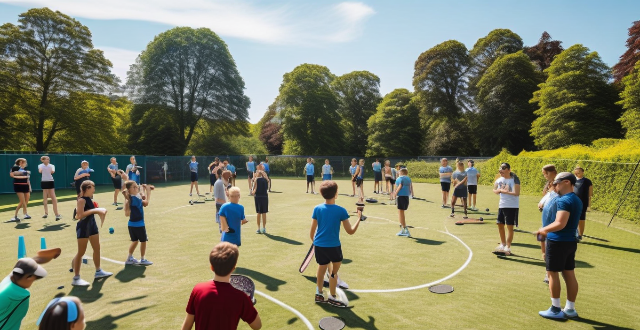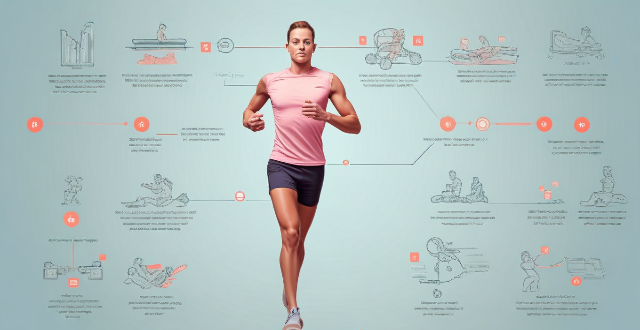Cognitive Intensity

How does exercise improve cognitive function ?
Exercise plays a crucial role in enhancing cognitive function, including memory, attention, and problem-solving skills. It promotes brain plasticity, increases blood flow and oxygenation, reduces inflammation, and improves sleep quality. Incorporating exercise into your routine can be done through various activities such as running, swimming, or yoga. Start small and gradually increase intensity and duration, find enjoyable activities, incorporate mindful movement, make it social, set realistic goals, and consult with a professional if needed.

Are certain durations or intensities of exercise more beneficial for cognition than others ?
Exercise has been shown to improve cognitive function, memory, and mental health. Both short-term and long-term exercise can enhance different aspects of cognition. Moderate-intensity exercise is most beneficial for older adults, while high-intensity exercise may also be advantageous but should not exceed certain levels. Aerobic exercise, resistance training, and balance exercises all contribute to cognitive improvement. Individual differences should be considered when determining the optimal exercise regimen for cognitive enhancement.

Is there a specific type of exercise that is most effective for enhancing cognitive abilities ?
Exercise has been shown to have numerous benefits on cognitive abilities, but is there a specific type of exercise that is most effective? Aerobic exercise improves blood flow and reduces stress, while resistance training boosts BDNF levels and enhances executive function. Combination exercises provide a comprehensive workout for the body and brain. Finding an exercise routine that you enjoy and can stick to is key to reaping the cognitive benefits over time.

Is high-intensity interval training (HIIT) beneficial for reducing stress ?
The text discusses the potential benefits of High-Intensity Interval Training (HIIT) for stress reduction, including releasing endorphins, improving cardiovascular health, boosting self-confidence, enhancing focus and concentration, and providing a sense of accomplishment. It also provides tips for incorporating HIIT into a routine, such as starting slowly, choosing enjoyable activities, setting realistic goals, incorporating recovery time, and seeking professional guidance.

How important is sleep for optimizing concentration and cognitive functions ?
The article discusses the significance of sleep for enhancing concentration and cognitive functions. It states that adequate sleep is crucial for improving attention span, alertness, memory consolidation, learning capacity, problem-solving abilities, and decision-making skills. The benefits of getting enough sleep include improved productivity, better performance, reduced stress levels, and enhanced mood. Therefore, prioritizing sleep as part of a healthy lifestyle is essential to optimize concentration and cognitive functions.

Can exercise reverse cognitive impairment caused by neurological disorders ?
Exercise may help reverse cognitive impairment caused by neurological disorders. Studies have shown that exercise can improve cognitive function in people with Alzheimer's disease, Parkinson's disease, and stroke. Exercise may also reduce inflammation, improve balance and mobility, and increase overall quality of life for people with neurological disorders. More research is needed to fully understand the effects of exercise on cognitive impairment caused by neurological disorders.

How does exercise influence neuroplasticity and cognitive function ?
Exercise has a positive impact on neuroplasticity and cognitive function by increasing blood flow, releasing growth factors, reducing inflammation, improving attention and concentration, enhancing memory, and slowing cognitive decline. Incorporating regular physical activity into your lifestyle can have numerous benefits for your brain health and overall well-being.

Is there a relationship between exercise and cognitive function ?
Exercise is a potential intervention for enhancing cognitive function across the lifespan. The relationship between exercise and cognitive function is complex and multifaceted, involving various aspects of cognition and different types of exercise. Long-term exercise interventions have consistently shown positive effects on cognitive function, particularly in older adults. Different types of exercise may influence specific cognitive functions differently, and the underlying mechanisms behind these effects are still being explored. By incorporating regular physical activity into our daily routines, we can potentially enhance our cognitive function and overall well-being.

Can regular exercise prevent cognitive decline in older adults ?
Regular exercise may help prevent cognitive decline in older adults by promoting neuroplasticity, improving blood flow to the brain, and reducing inflammation. Multiple studies have found positive associations between physical activity and cognitive function in this age group. Guidelines recommend aerobic exercise, resistance training, and activities that improve flexibility and balance. Making exercise a regular part of daily life is key for maintaining cognitive benefits over time.

Is there a link between physical fitness and cognitive function ?
The text discusses the potential link between physical fitness and cognitive function, citing research that suggests a correlation. It defines physical fitness as the ability to perform aspects of sports or occupations, obtained through proper nutrition, exercise, and rest, and cognitive function as mental processes involving perceiving, remembering, reasoning, problem-solving, understanding, judging, and learning. The text mentions studies that suggest enhanced physical fitness can improve cognitive function in older people without known cognitive impairment and that physical fitness could be a better predictor of cognitive performance than physical activity. It also discusses potential mechanisms behind the relationship, including increased blood flow to the brain and the release of chemicals that promote cell growth, improvement, and survival. Finally, it notes the potential implications of this research for individual and societal health.

How does physical activity affect children's cognitive development ?
This article discusses the positive impacts of physical activity on children's cognitive development, including improved attention and memory, enhanced executive functioning, increased learning abilities, reduced stress and anxiety, and promoted socialization and teamwork skills. Regular exercise can enhance blood flow to the brain, strengthen neural connections in the prefrontal cortex, stimulate neurogenesis, release endorphins, and provide a healthy outlet for releasing energy and emotions. Encouraging children to engage in regular physical activity can have long-lasting positive effects on their overall well-being and success throughout life.

How does exercise affect brain function and cognitive abilities ?
This article discusses how regular physical activity positively impacts brain function and cognitive abilities by improving blood flow, boosting neurotrophic factors, enhancing plasticity, and reducing inflammation. It emphasizes the importance of incorporating exercise into one's lifestyle for maintaining and enhancing cognitive health.

Does exercise have different effects on cognitive function at different ages ?
This article explores the relationship between exercise and cognitive function across various age groups. It highlights the benefits of exercise for children's cognitive development, adults' reduced risk of cognitive decline, and older adults' slowed cognitive decline. Examples of suitable exercises for each age group are provided, including playing sports for children, aerobic activities for adults, and walking or cycling for older adults. The article concludes that incorporating physical activity into daily routines at any age is crucial for maintaining cognitive health and overall well-being.

What are the implications of cognitive development theories in educational psychology ?
Cognitive development theories have significant implications in educational psychology. These theories help educators understand how children think, learn, and process information. By applying these theories, educators can create effective learning environments that cater to the cognitive needs of their students. Piaget's theory suggests that children progress through four stages of cognitive development and emphasizes the importance of hands-on activities and constructivist learning. Vygotsky's sociocultural theory highlights the role of social interaction and cultural tools in cognitive development. Information processing theory focuses on working memory, cognitive load, and metacognition. By understanding these theories, educators can enhance student learning and promote cognitive growth.

How does caffeine influence workout intensity and results ?
Caffeine can boost workout intensity and results by increasing energy levels, improving focus, and enhancing endurance. However, it's important to be aware of potential side effects like dehydration risks, sleep disruption, and dependency issues. Moderation and individualized consideration are key when incorporating caffeine into a fitness routine.

Can exercise compensate for poor sleep quality in terms of cognitive function ?
The article discusses the importance of sleep for cognitive function and whether exercise can compensate for poor sleep quality. While exercise has benefits for cognitive function, it cannot fully replace the memory consolidation and emotion processing that occurs during sleep. Chronic sleep deprivation can lead to long-term changes in brain structure and function that may not be reversible through exercise alone. To maintain optimal cognitive function, both regular physical activity and good sleep habits are essential.

What role does exercise play in maintaining cognitive function in old age ?
Exercise is crucial for maintaining cognitive function in old age, with benefits including improved blood flow, reduced inflammation, and increased neuroplasticity. Aerobic exercise, resistance training, and activities like yoga and tai chi are all beneficial. Incorporating physical activity into your daily routine can help keep your mind sharp as you age.

How can I avoid injury after a high-intensity workout
To avoid injury after a high-intensity workout, it is important to warm up properly, stretch, use proper form, take breaks, stay hydrated, and wear appropriate clothing. These tips will help reduce the risk of injury and allow you to continue enjoying the benefits of high-intensity workouts.

How long after starting an exercise routine can improvements in cognitive function be expected ?
The text discusses the timeline for improvements in cognitive function after starting an exercise routine. It mentions that immediate benefits such as enhanced mood, improved attention and focus, and increased energy levels can be noticed within 1-3 months. Mid-term benefits like enhanced memory retention, improved executive function, and increased creativity can be observed within 3-6 months. Long-term benefits such as slowed cognitive decline, reduced risk of cognitive disorders, and sustained improvements in overall cognitive performance can be achieved after six months or longer. The text emphasizes the importance of maintaining a consistent exercise regimen over the long term for sustained enhancements in various aspects of cognitive function.

How does high-intensity interval training (HIIT) affect cardiorespiratory fitness ?
High-intensity interval training (HIIT) is a form of exercise that involves short bursts of intense activity followed by periods of rest or low-intensity exercise. This type of training can improve cardiorespiratory fitness by increasing the heart rate and improving blood flow throughout the body, leading to improved muscle performance and endurance. HIIT also helps to burn calories and fat, making it an effective way to promote weight loss. Additionally, HIIT workouts can be done in a shorter amount of time than other forms of exercise, making it a great option for those who are short on time but still want to stay active and healthy. Overall, incorporating HIIT into your workout routine can provide numerous benefits for your cardiorespiratory fitness and overall health.

Is it safe for elderly people to engage in high-intensity workouts ?
The safety of high-intensity workouts for elderly people depends on various factors such as health status, fitness level, balance and coordination, recovery time, and necessary modifications and adaptations. It is essential to consult with a healthcare professional before starting any exercise program.

Does exercise influence emotional regulation and mental well-being, which in turn affects cognitive processes ?
The article explores the relationship between exercise, emotional regulation, mental well-being, and cognitive processes. It suggests that regular physical activity can positively impact emotional regulation by reducing stress levels, improving self-esteem, and providing a healthy outlet for negative emotions. Exercise also contributes to improved mental well-being by alleviating symptoms of depression and anxiety, promoting relaxation, and providing opportunities for social interaction. These factors, in turn, influence cognitive processes such as attention, memory, problem solving, and decision making. Overall, the article concludes that incorporating exercise into daily routines can have numerous benefits for overall health and well-being.

Can team sports or group exercises provide additional cognitive benefits compared to individual activities ?
Team sports and group exercises provide cognitive benefits such as improved social skills, enhanced cognitive functioning, increased self-esteem and confidence, and personal growth opportunities. Participating in these activities helps individuals develop strong communication skills, cooperation, conflict resolution abilities, attention and focus, decision making skills, memory retention, and a sense of achievement. These skills can be applied in all aspects of life, leading to personal growth and development.

Is it necessary to do a warm-up even for low-intensity workouts ?
A proper warm-up is crucial for any workout, including low-intensity exercises. It increases blood flow and oxygenation, raises muscle temperature, improves range of motion, primes the nervous system, reduces injury risk, and boosts performance. Even for gentle activities like walking or yoga, a warm-up enhances mental focus, gradually activates muscles, promotes consistency, supports joint health, and eases into stretching. Warm-up ideas include walking, dynamic stretching, Tai Chi movements, Pilates exercises, and deep breathing or meditation. Incorporating a warm-up before any workout is essential for maximizing performance, reducing injury risk, and enhancing overall health benefits.

How does exercise physiology explain the benefits of high-intensity interval training (HIIT) ?
High-intensity interval training (HIIT) is a form of exercise that involves short, intense bursts of activity followed by periods of rest or low-intensity exercise. From an exercise physiology perspective, HIIT offers numerous benefits, including increased metabolic rate, improved cardiovascular health, muscle development and endurance, favorable hormonal responses, mental health advantages, reduced injury risk, and time efficiency. These factors make HIIT a popular and effective method for achieving various fitness goals.

Is there a specific duration or intensity of exercise needed to improve immune function ?
The relationship between exercise and immune function is complex, but research suggests that regular physical activity can enhance the immune system. However, both the duration and intensity of exercise play significant roles in achieving this beneficial effect. The American Heart Association recommends at least 150 minutes of moderate-intensity aerobic activity or 75 minutes of vigorous-intensity activity per week for adults. Engaging in prolonged periods of endurance exercise can temporarily suppress immune function due to increased stress on the body. Light activities like walking or yoga can still offer immune benefits by reducing stress and promoting overall health. Regular moderate to high-intensity exercises, such as jogging, cycling, or strength training, are generally considered optimal for enhancing immune function. Adequate rest and recovery are crucial for maintaining a healthy immune system. Combining different types of exercises (aerobic, strength training, flexibility work) can provide a well-rounded approach to enhancing immune function. Staying hydrated and consuming a balanced diet rich in nutrients supports both exercise performance and immune health. Other lifestyle habits, including sleep quality, stress management, and avoidance of harmful substances, also play a vital role in supporting immune function alongside exercise.

Are there any risks associated with high-intensity workouts for seniors, especially in a group setting ?
High-intensity workouts in a group setting pose certain risks for seniors, including cardiovascular strain, musculoskeletal stress, overexertion and fatigue, and social and psychological factors. To minimize these risks, seniors should consult with a healthcare professional, start slowly and gradually increase intensity, focus on low-impact activities, stay hydrated and monitor temperature, wear appropriate footwear and clothing, listen to their body, and seek supervision from qualified instructors.

How does climate variability impact the frequency and intensity of extreme weather events like floods and hurricanes ?
Climate variability, which can be natural or human-induced, has a significant impact on the frequency and intensity of extreme weather events such as floods and hurricanes. Changes in rainfall patterns, sea level rise, and land use changes can increase the risk of flooding, while warmer ocean temperatures, atmospheric conditions, and El Niño Southern Oscillation (ENSO) can affect hurricane formation and intensity. As our planet continues to warm due to human activities, it is crucial that we take steps to mitigate the impacts of climate change and adapt to its effects on our environment and communities.

How often should seniors engage in aerobic activities for heart health ?
Engaging in regular aerobic activities is crucial for seniors to maintain heart health and overall well-being. The American Heart Association recommends at least 150 minutes of moderate-intensity or 75 minutes of vigorous-intensity aerobic activity per week, spread throughout the week. For seniors, this could include brisk walking, swimming, or biking for at least 30 minutes five days a week (moderate intensity) or running and fast cycling for at least 25 minutes three days a week (vigorous intensity), depending on their capability and medical restrictions. Regular aerobic activity offers numerous benefits for seniors, including improved cardiovascular fitness, better blood pressure and cholesterol levels, weight management, increased muscular strength and endurance, and boosted mental health. However, safety precautions should be taken, such as consulting with a healthcare provider before starting an exercise program, starting slowly, choosing low-impact exercises, staying hydrated, wearing appropriate clothing and footwear, and monitoring bodily responses to the activity. By following these guidelines and taking necessary precautions, seniors can significantly improve their quality of life and maintain their independence longer.

How much exercise is needed to see mental health benefits ?
Regular physical activity is known to improve mental health, but the amount of exercise needed varies based on individual factors. The WHO recommends at least 150 minutes of moderate-intensity aerobic activity and muscle-strengthening activities twice a week for adults. Even small amounts of light activity can have mental health benefits, with moderate-intensity activities like brisk walking improving outcomes significantly. Consistency is key, and personalizing your exercise routine based on preferences and capabilities is essential.